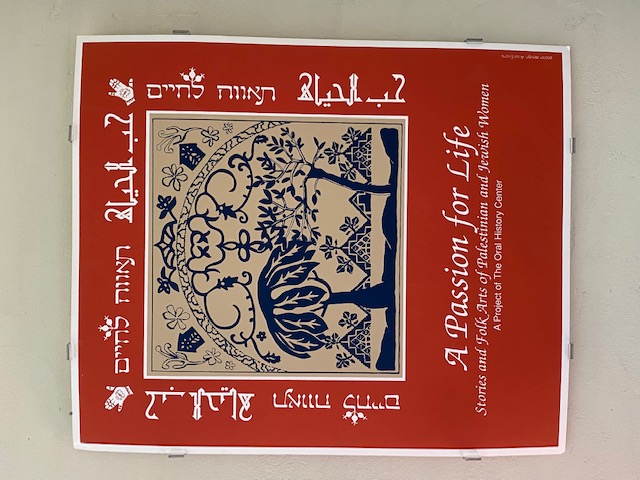Cindy Cohen's Reflections on 'A Passion for Life'

By Cindy Cohen, Ph.D
Founding Director, the Program in Peacebuilding and the Arts
Over thirty years ago, Feryal Abbasi Ghnaim, a Palestinian embroiderer, and I co-directed an oral history/folklore project entitled A Passion for Life: Stories and Folk Arts of Palestinian and Jewish Women. It was a complex, difficult and in many ways successful project, and several years later I wrote a reflection on it, Removing the Dust from Our Hearts: The Search for Reconciliation in the Narratives of Palestinian and Jewish Women, which was published in the journal of the National Women’s Studies Association. As I reread that essay in the context of the anguish, heartbreak and rage engendered by contemporary events in the Middle East, I see how meager were our efforts in comparison to the enormity and complexity of the conflict we sought to address. At the same time, the intention that animated our project – the desire to find modes of expression and communication that would support people to reach beneath their defenses and to appreciate each other’s humanity – still points to necessary and urgent work. We looked to the stories and folk expressions of women, and through them we found and created moments of deep, reciprocal recognition that heightened our yearning for reconciliation. I wonder whether now arts-based and cultural initiatives could be crafted exquisitely and strategically enough to contribute to the shifts in consciousness that will be required for the emergence of as-yet-unimagined paths towards healing, justice and peace.
A Passion for Life helped launch the distinguished career of Feryal Abbasi Ghnaim, who, in 2018 became the first Palestinian woman to receive the prestigious National Endowment for the Arts National Heritage Fellowship. Her daughter, Wafa Ghnaim, has opened Tatreez & Tea, a Palestinian-led educational institute focused on preservation, documentation and research of textiles in South West Asia and North Africa (SWANA).
An additional perspective on A Passion for Life informed “Passionate Differences: A Working Model for Cross-cultural communication,” an article by Kristin Metz, who served as the facilitator of the project’s directions committee, published in The Journal of Feminist Studies in Religion.
A Passion for Life also initiated a trajectory of action, reflection and relationship-building in my own career that led to the development of the Program in Peacebuilding and the Arts and the undergraduate interdisciplinary minor in Creativity, the Arts, and Social Transformation at Brandeis, and to the cultivation of the field of Arts, Culture and Conflict Transformation (ACCT) globally. Several markers along the way relate directly to the conflict in the Middle East. They include
- A Poetics of Reconciliation: The Aesthetic Mediation of Conflict, my (long) dissertation which includes poetic renderings of some of the stories gathered in A Passion for Life, as well as explorations of ethical and epistemological questions that emerged in the project
- Working with Groups in Conflict: The effects of power on the dynamics of the group, a short reflection on our co-facilitation of Israeli and Palestinian dialogue groups written with my colleague Farhat Agbaria
- Working with Integrity: A Guidebook for Peacebuilders Asking Ethical Questions, an resource which includes a section that explores whether oppressed people should be asked to empathize with their oppressors
- Community History by Youth in the Middle East, CHYME, a four-year program of the International Center for Ethics, Justice and Public Life, undertaken with Israeli, Jordanian and Palestinian partners, which allowed for the formation of a still-vibrant organization, the American Friends of the Palestinian House of Friendship.